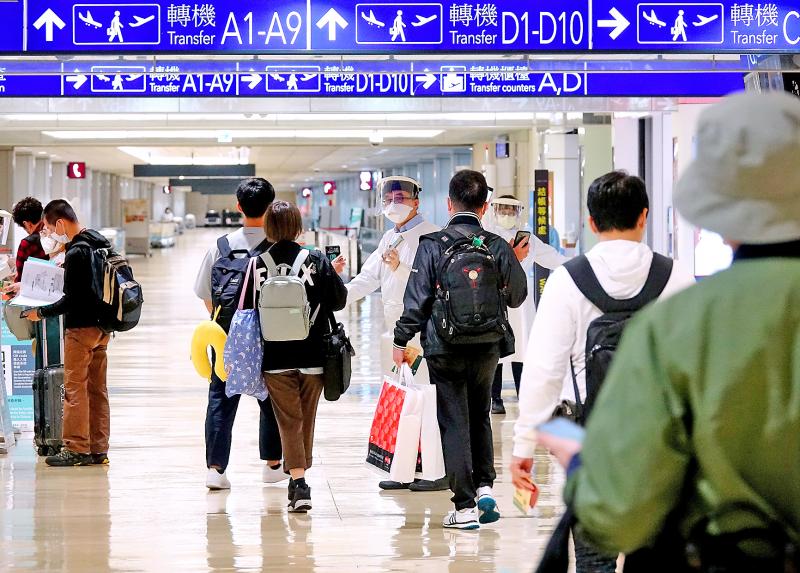Taiwan’s first cases of the new Omicron subvariants BA.4 and BA.5 of SARS-CoV-2 have been detected in five people arriving from overseas, the Central Epidemic Command Center (CECC) said yesterday.
Centers for Disease Control Deputy Director-General Philip Lo (羅一鈞), who is deputy head of the CECC’s medical response division, said genome sequencing conducted on virus samples from 57 imported cases last week showed that four people were infected with the BA.5 subvariant, one with the BA.4 subvariant and the rest with the BA.2 subvariant.
While the new subvariants account for a small proportion of total imported cases, they have not been found in local cases, he added.

Photo: Chu Pei-hsiung, Taipei Times
The four cases of the BA.5 subvariant were found in people who arrived from the US, Turkey and Poland, while the BA.4 subvariant was found in a traveler who arrived from Chile, Lo said.
The people with BA.5 infections are asymptomatic or have mild COVID-19 symptoms, with one reporting a sore throat and another an abnormal sense of taste, he said.
Health authorities in South Africa first detected the BA.4 and BA.5 subvariants in January and February respectively, Lo said, adding that they triggered a new wave of COVID-19 infections in that country in April and May.
Studies have shown that the two subvariants are more easily transmitted than previous Omicron subvariants and have a degree of “immune escape” — the ability to evade immune protection in the body induced by previous infection or vaccination, he said.
WHO data released on Wednesday last week showed that the BA.4 and BA.5 subvariants have been reported in more than 40 countries, he said.
“Based on current studies, there is no indication that the Omicron BA.4 and BA.5 subvariants cause a higher risk of severe cases, but they are more contagious and capable of escaping immune protection,” he said, adding that the center is closely monitoring any changes in COVID-19 detected in imported cases, while increasing vaccination rates.
The risk of being reinfected with the same strain of SARS-CoV-2 is relatively low, but not impossible, Lo said, adding that if the BA.4 and BA.5 subvariants become the primary circulating viruses in the local community, the risk of reinfection could rise.
Experts agree that a person’s immune protection from a previous COVID-19 infection can last about three months, but a few people might still contract the disease again, he said.
Asked whether “herd immunity” would be effective against the BA.4 and BA.5 subvariants, Lo said that the local outbreak is mainly caused by the BA.2 subvariant, with antibodies protecting against the BA.1 and BA.2 subvariants for at least three to four months.
Over the weekend, he said the BA.1 subvariant has not been recorded locally since April 21.

The Central Election Commission has amended election and recall regulations to require elected office candidates to provide proof that they have no Chinese citizenship, a Cabinet report said. The commission on Oct. 29 last year revised the Measures for the Permission of Family-based Residence, Long-term Residence and Settlement of People from the Mainland Area in the Taiwan Area (大陸地區人民在台灣地區依親居留長期居留或定居許可辦法), the Executive Yuan said in a report it submitted to the legislature for review. The revision requires Chinese citizens applying for permanent residency to submit notarial documents showing that they have lost their Chinese household record and have renounced — or have never

A magnitude 5.6 earthquake struck off the coast of Yilan County at 12:37pm today, with clear shaking felt across much of northern Taiwan. There were no immediate reports of damage. The epicenter of the quake was 16.9km east-southeast of Yilan County Hall offshore at a depth of 66.8km, Central Weather Administration (CWA) data showed. The maximum intensity registered at a 4 in Yilan County’s Nanao Township (南澳) on Taiwan’s seven-tier scale. Other parts of Yilan, as well as certain areas of Hualien County, Taipei, New Taipei City, Taoyuan, Hsinchu County, Taichung and Miaoli County, recorded intensities of 3. Residents of Yilan County and Taipei received

Taiwan has secured another breakthrough in fruit exports, with jujubes, dragon fruit and lychees approved for shipment to the EU, the Ministry of Agriculture said yesterday. The Animal and Plant Health Inspection Agency on Thursday received formal notification of the approval from the EU, the ministry said, adding that the decision was expected to expand Taiwanese fruit producers’ access to high-end European markets. Taiwan exported 126 tonnes of lychees last year, valued at US$1.48 million, with Japan accounting for 102 tonnes. Other export destinations included New Zealand, Hong Kong, the US and Australia, ministry data showed. Jujube exports totaled 103 tonnes, valued at

BIG SPENDERS: Foreign investors bought the most Taiwan equities since 2005, signaling confidence that an AI boom would continue to benefit chipmakers Taiwan Semiconductor Manufacturing Co’s (TSMC, 台積電) market capitalization swelled to US$2 trillion for the first time following a 4.25 percent rally in its American depositary receipts (ADR) overnight, putting the world’s biggest contract chipmaker sixth on the list of the world’s biggest companies by market capitalization, just behind Amazon.com Inc. The site CompaniesMarketcap.com ranked TSMC ahead of Saudi Aramco and Meta Platforms Inc. The Taiwanese company’s ADRs on Tuesday surged to US$385.75 on the New York Stock Exchange, as strong demand for artificial intelligence (AI) applications led to chip supply constraints and boost revenue growth to record-breaking levels. Each TSMC ADR represents